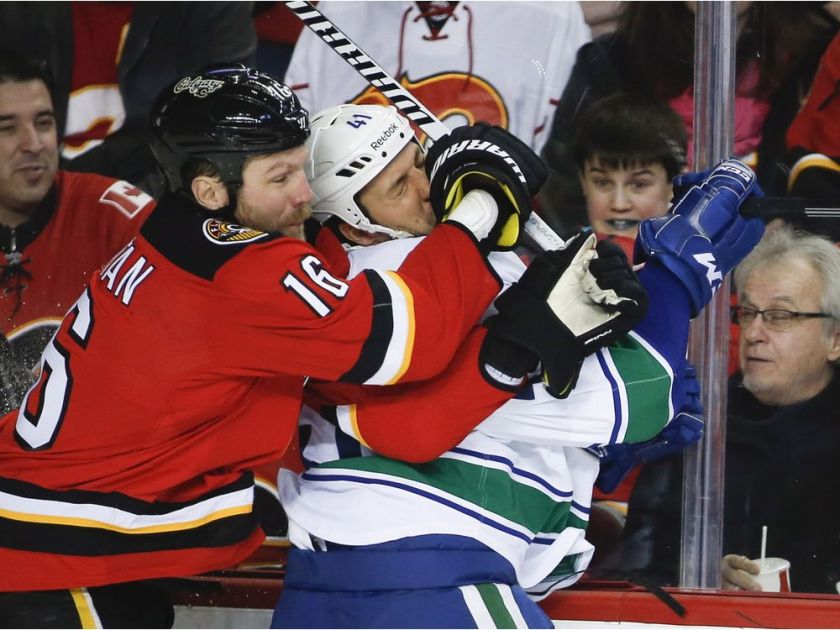You are here
Home 🌿 Cannabis Technology News 🌿 Cannabis trial for post-concussion problems offers hope to former NHL players 🌿Cannabis trial for post-concussion problems offers hope to former NHL players

Former Vancouver Canuck Andrew Alberts says NHL alumni are hopeful a new clinical study will find cannabinoids can help treat post-concussion neurological problems.
The double-blind study will include about 100 former players from all different eras of the game — including those who played with and without helmets — and will try to determine the medicinal value of marijuana among those dealing with impairments from past concussions, including depression, post-traumatic stress disorders and progressive dementia.
The NHL Alumni Association has partnered with cannabis company Canopy Growth on the one-year study, and it will be led by NEEKA Health Canada.
“Hopes are high,” said Alberts, whose professional hockey career ended after he suffered a concussion in 2013.
“I think guys are going to heavily lean on this at the beginning to see if it can help and provide some treatment.”
The former defenceman said he is someone who heavily researches therapies before deciding to try them.
“I always do my background checks and talk to the right individuals and doctors before I really jump into something. But it’s something I’m definitely looking forward to because so far (cannabis has) proven to do things that other drugs and other therapies have not been able to do.”
Glenn Healy, a former goaltender and the head of the NHLAA, said cannabinoids will be one of several different elements employed to try to tackle the post-concussion problems former players are experiencing.
“It’s a priority for me. The calls I get, it’s from the kids. Or it’s from the wife. It’s not from the player,” he said.
“What’s most troubling now is I don’t have a place to give hope,” he said. “Now, at least we’re going down the road of being the first sports entity to say look it, we give a s—. And we’re going to get some answers.”
Zach Walsh, an associate professor of psychology at the University of B.C., said the planned research was important because there haven’t yet been human trials to demonstrate that cannabis can help with post-concussion problems, “but there’s good reason to be hopeful.”
Walsh said medicinal cannabis could have a calming effect for those experiencing issues that go side-by-side with traumatic brain injuries, like serious anxiety, relationship difficulties, impulsiveness, irritability and cognitive interference.
“In terms of actually resolving the injury through the anti-inflammatory effects of CBD (a cannabinoid), that’s a second question. And what we see there is research from animal models that gives theoretical rationale, and there’s some anecdotal evidence, but the reason we need to do the research is to really see in humans how it works,” he said.
“I think we’re about to enter a golden age where there’s a lot of trials for different conditions that we’ve all been wanting to see for a long time.”
A pair of forwards who played for the Philadelphia Flyers in the same year as Alberts have been vocal about cannabis and its potential to help those who have suffered repeated concussions.
One is Riley Cote, who has spoken in favour of cannabinoids for pain management and relief of anxiety and depression. The other is Dan Carcillo, who has lauded them for creating new neurological pathways. Carcillo was a friend and teammate of the Steve Montador who suffered from post-concussion impairments and died in 2015.
Alberts said if the NHLAA-partnered research shows cannabinoids can “help players with recovery and concussions and all the neurological effects, and it can help reverse those or create new neurological pathways,” he hoped the NHL would get on board.
“I think they should take part. If they care about their players they should.”
Cannabis is banned in the NHL. The league tests players for it, but it doesn’t discipline them for using it. NHL deputy commissioner Bill Daly recently told The Associated Press the league did not expect to change its rules on cannabis.
Former Canuck forward Cliff Ronning said he didn’t know any former players who have been using cannabinoids to treat their symptoms.
“It seems to be so new to the culture,” he said.
Active players have also said as much, including former Canucks’ defenseman Erik Gudbranson, who previously told Postmedia he didn’t know any players who used cannabis.
420 Intel is Your Source for Marijuana News
420 Intel Canada is your leading news source for the Canadian cannabis industry. Get the latest updates on Canadian cannabis stocks and developments on how Canada continues to be a major player in the worldwide recreational and medical cannabis industry.
420 Intel Canada is the Canadian Industry news outlet that will keep you updated on how these Canadian developments in recreational and medical marijuana will impact the country and the world. Our commitment is to bring you the most important cannabis news stories from across Canada every day of the week.
Marijuana industry news is a constant endeavor with new developments each day. For marijuana news across the True North, 420 Intel Canada promises to bring you quality, Canadian, cannabis industry news.
You can get 420 Intel news delivered directly to your inbox by signing up for our daily marijuana news, ensuring you’re always kept up to date on the ever-changing cannabis industry. To stay even better informed about marijuana legalization news follow us on Twitter, Facebook and LinkedIn.




